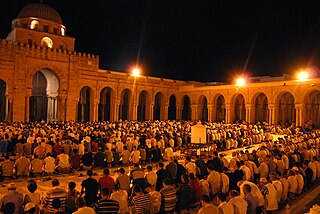
The Maghrib prayer is one of the five mandatory salah, and contains three cycles (rak'a). If counted from midnight, it is the fourth one.

The Isha prayer is one of the mandatory five daily Islamic prayers, and contains four cycles.

In Islam, Friday prayer, or Congregational prayer is a community prayer service held once a week on Fridays. All Muslim men are expected to participate at a mosque with certain exceptions due to distance and situation. Women and children can also participate but do not fall under the same obligation that men do. The service consists of several parts including ritual washing, chants, recitation of scripture and prayer, and sermons.

The Zuhr prayer is one of the five daily mandatory Islamic prayers (salah). It is observed after Fajr and before Asr prayers, between the zenith of noon and sunset, and contains 4 rak'a (units).

The Asr prayer is one of the mandatory five daily Islamic prayers.
Witr is an Islamic prayer (salat) that is performed at night after Isha or before fajr. Witr has an odd number of raka'at prayed in pairs, with the final raka'ah prayed separately.

Qiyām is an integral part of the Islamic salah. The prayer begins in the standing position and some prayers only require the qiyām, such as Salat al-Janazah.

A Rak'a is a single iteration of prescribed movements and supplications performed by Muslims as part of the prescribed obligatory prayer known as salah. Each of the five daily prayers observed by Muslims consists of a number of raka'at.

Tarawih are special Sunnah prayers involving reading long portions of the Quran, and performing up to 20 rakahs, which are performed only in the Islamic month of Ramadan. The entire Quran is recited in the Tarawih prayers at a mosque, typically at the rate of one Juz' per night.

Tayammum is the Islamic act of dry ritual purification using purified (clean) sand or stone or mud, which may be performed in place of ritual washing if no clean water is readily available or if one is suffering from moisture-induced skin inflammation or scaling or illness or hardship.

Purity is an essential aspect of Islam. It is the opposite of najāsa, the state of being ritually impure. It is achieved by first removing physical impurities from the body, and then removing ritual impurity through wudu (usually) or ghusl.

Sujūd, or sajdah, also known as sijda,sejda or shejda is the act of low bowing or prostration to God facing the qiblah. It is usually done in standardized prayers (salah). The position involves kneeling and bowing till one touches the ground with 7 bones (points): the forehead & nose, two hands, two knees and two sets of toes. In accordance with the Sunnah of Muhammad, one's elbows should be far from one's body, unless it causes discomfort to other worshippers. Some scholars hold the position that this applies only to men, and that women are encouraged to tuck their elbows in out of modesty.
Muzdalifah is an open and level area near Mecca in the Hejazi region of Saudi Arabia that is associated with the Ḥajj ("Pilgrimage"). It lies just southeast of Mina, on the route between Mina and Arafat.

In Islam, a Nafl Prayer, or optional prayer, is a type of a non-obligatory prayer. They are believed to give extra reward to the person performing them, similar to sunnah prayers.

A Sunnah prayer is an optional or supererogatory salah that can be performed in addition to the five daily salah, which are compulsory for all Muslims. Sunnah prayer have different characteristics: some are done at the same time as the five daily compulsory prayers, some are done only at certain times, or only for specific occasions ; some have their own name and some are identified by how they are performed. The length of Sunnah prayer also varies.
Holy Du'ā is the mandatory Nizari Isma'ili prayer recited three times a day: Fajr prayer at dawn, Maghrib prayer at sundown and Isha prayer in the evening. Each Holy Du'a consists of 6 rakat, totaling 18 per day, as opposed to the 17 of Sunni and Twelver salat (namaz).

Salah is the practice of formal worship in Islam, consisting of a series of ritual prayers performed at prescribed times daily. Facing the Kaaba in Mecca, it consists of units known as rak'ah, which include a specific set of physical postures, recitation from the Quran, and prayers from the Sunnah. The number of rak'ah varies depending on the specific prayer. Variations in practice are observed among adherents of different madhahib. The term salah may denote worship in general or specifically refer to the obligatory prayers performed by Muslims five times daily, or, in some traditions, three times daily.

Salat al-jama‘ah or prayer in congregation (jama'ah) is considered to have more social and spiritual benefit than praying by oneself. When praying in congregation, the people stand in straight parallel rows behind the chosen imam, facing qibla. The imam, who leads the congregation in salat, is usually chosen to be a scholar or the one who has the best knowledge of the Qur'an, preferably someone who has memorised it in its entirety. In the first row behind the Imam, if available, would be another hafiz to correct the Imam in case a mistake is made during the performance of the salat. The prayer is performed as normal, with the congregation following the actions and movements of the imam as he performs the salat.

The signs prayer is one of the Muslim prayers that is optional for Sunni Muslims, but mandatory for Shīʿa Muslims. When solar or lunar eclipses, earthquakes, thunder, or other natural phenomena occur, Muslims may have to pray Ṣalāt al-ʾĀyāt. In Twelver Shia Islam, al-Ayat Prayer consists of two Rakats, and there are five Ruku in each. It is for specific conditions and have been described in detail in resalah of marja's.















